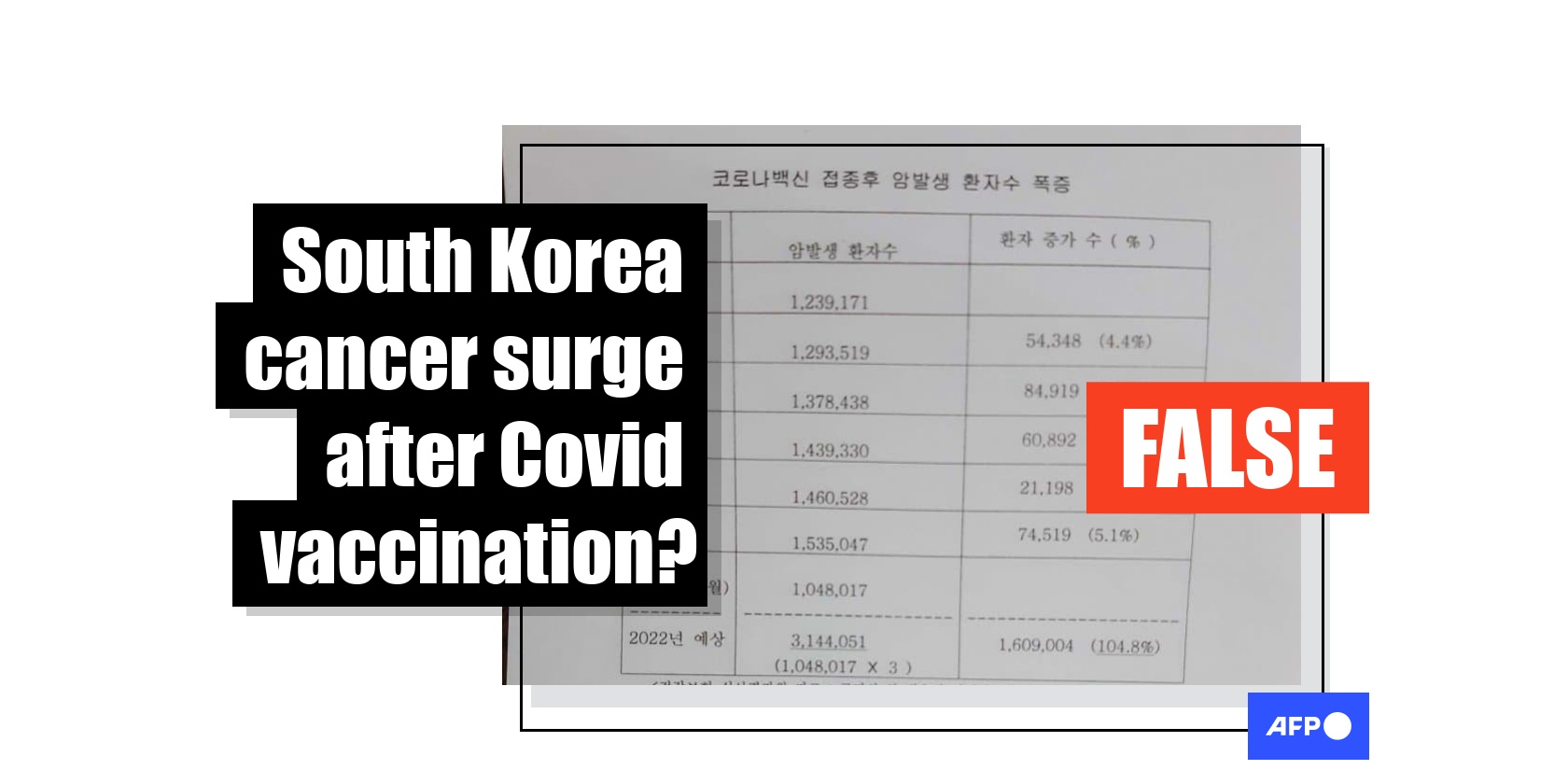
Health insurance data falsely shared as 'spike in vaccine-related cancer cases' in South Korea
- This article is more than three years old.
- Published on February 9, 2023 at 08:42
- 2 min read
- By SHIM Kyu-Seok, AFP South Korea
"In 2022, the number of cancer cases tripled. I cannot think of any other explanation besides the Covid-19 vaccines," reads a Korean-language Facebook post shared on November 21.
The Facebook post shows a photo of a datasheet titled: "Massive spike in patients diagnosed with cancer after Covid vaccinations".
The datasheet is credited to South Korea's Health Insurance Review and Assessment Service (HIRA), a government agency responsible for reviewing and evaluating healthcare costs and services.

The document says there were between 1.2 million and 1.5 million new cancer cases every year between 2016 and 2021, but that this shot up to more than three million new cancer cases in 2022 -- the year after South Korea began its Covid-19 vaccine roll-out in February 2021.
It alleges Covid-19 vaccines are the "direct cause" of the purported rise in the number of cancer cases.
Around 88 percent of South Koreans had received at least two Covid-19 vaccine doses, as of February 9, 2023.
The same chart was shared on Facebook here and here and on South Korean platform Naver Blog here and here.
Health experts have insisted Covid-19 vaccines are safe and effective, faced with a wave of misinformation about the jabs, including false narratives that they cause illnesses such as AIDS or cancer.
Misrepresented data
A representative for HIRA said that the figures cited in the chart were "erroneously labelled".
"The numbers seen in this chart represent the number of patients who filed health insurance claims related to cancer each corresponding year, not the number of new cancer patients," the spokesperson told AFP on February 3.
"A claim may be recorded each time a person visits the hospital to be treated for cancer, and a patient may visit the hospital several times a year," they added.
The number of new cancer cases recorded in South Korea increased from around 233,000 in 2016 to 257,000 in 2019, before dipping to 247,000 in 2020, according to the latest data published in a report by the National Cancer Center, the government's cancer research arm.
Professor Myung Seung-kwon from the centre's Graduate School of Cancer Science and Policy told AFP on February 3 that data for 2021 and 2022 would be released towards the end of the year.
"The data is highly likely to show that cancer diagnoses have remained similar or even fallen since Covid-19 vaccinations began, as people were more reluctant to visit hospital throughout the pandemic," he said.
"There is also no medical evidence or a scientific rationale that shows that Covid-19 vaccinations lead to any form of cancer,” he said.
Various medical institutions, including the American Cancer Society and the Memorial Sloan Kettering Cancer Center, have dismissed claims that Covid-19 vaccines cause cancer.
"None of the vaccines interact with or alter your DNA in any way, and therefore cannot cause cancer," the Memorial Sloan Kettering Cancer Center says.
The World Health Organization and US Centers for Disease Control and Prevention (CDC) do not list cancer as a possible adverse effect from Covid-19 vaccination.
Copyright © AFP 2017-2026. Any commercial use of this content requires a subscription. Click here to find out more.
Is there content that you would like AFP to fact-check? Get in touch.
Contact us
